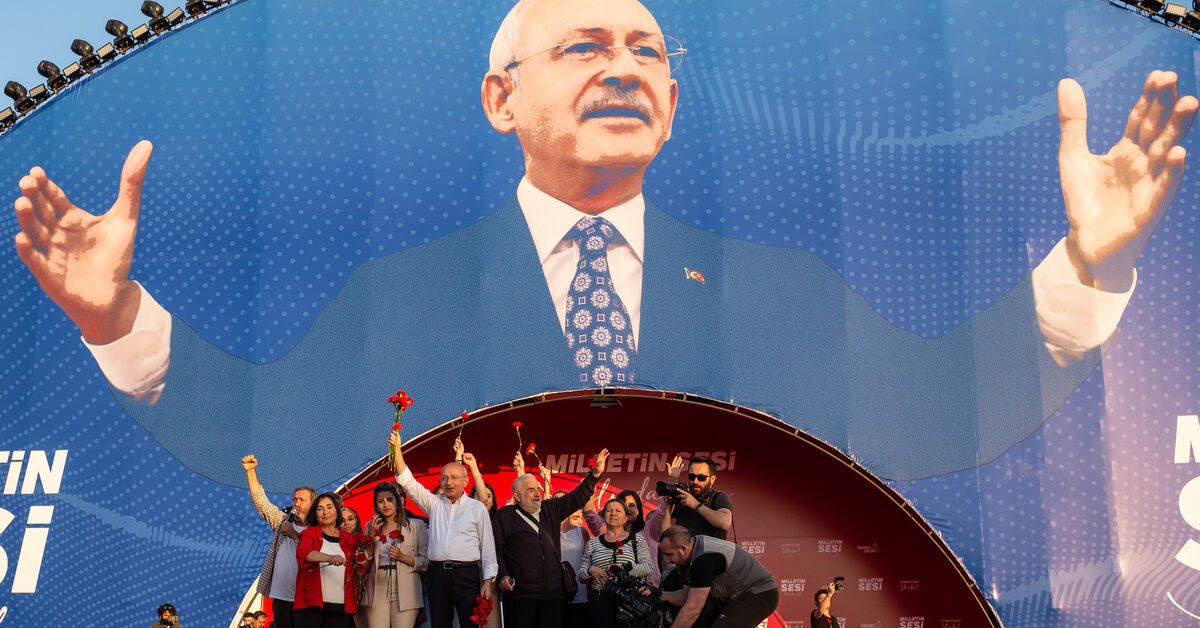In the video titled “Alevi,” Kılıçdaroğlu called on young people who are going to vote for the first time to “pull this country out of the harmful sectarian debates.”
“Dear young people who will vote for the first time in this election. It’s time for us to talk to you tonight about something very private, very sensitive. Do you hear the sounds of the new life that is about to begin in Turkey? Either we will overcome this threshold we are stuck in and we will reach the place we deserve in the world, we will be honorable citizens of a happy and strong country, or we will be content with just watching the world outside of us that we look at with longing,” Kılıçdaroğlu said in the beginning of the video.
“My dear young people who will vote for the first time. I am Alevi. I am a sincere Muslim who was raised with the faith of Prophet Muhammed and Ali. I was born in a poor house far from everything in this beautiful country that (Mustafa Kemal) Atatürk gifted us. Our identities are what makes us who we are. And of course we have to claim them with dignity, we cannot choose them. We are born, grow and live with them,” the 74-year-old leader said.
He added that there are some crucial things that “we can choose in this life.” “We can choose to be a good person, to be honest, to be moral, to be conscientious, to be virtuous and just. We can choose to live a better life in a free and wealthy country. These choices can quickly change both us and the society we live in. My dear young friend, as a country, we have a threshold ahead of us and we need you to cross this threshold together. Remember, with a single vote, you will pull this country out of the harmful sectarian debates, the Middle East that has been turned into a swamp, and move it to where it belongs.”
Kılıçdaroğlu said “we will no longer talk about identities, differences, and separations” but achievements, shared dreams, and concurrences. “Will you join our expedition of change? Will you stand with me in this change? Will you prefer an honest and moral system instead of this system that says no to Alevis?”
“Are you ready to abolish this system from its root? Come on, young people, let’s cross this threshold together. I believe that you will not waste a single vote at such a vital threshold. And I trust you wholeheartedly,” he lastly added.
Kılıçdaroğlu is running for the presidency for the May 14 election, alongside with ruling People’s Alliance candidate President Recep Tayyip Erdoğan, CHP-breakaway Homeland Party Chair Muharrem İnce and far-right ATA Alliance candidate Sinan Oğan.
Kılıçdaroğlu’s video has received immense support for openly talking about his Alevi heritage and for his call to end polarizing politics. His video on Twitter received more than 200,000 likes in a few hours.
Coming from Islamist traditions that also led to the ruling Justice and Development Party (AKP), CHP’s ally Felicity Party on Twitter said “We can put an end to this distorted order together by choosing good morality, justice, fairness and sincerity rather than polarization, marginalization and ‘identity politics’.”
Alevis in Turkey
Alevis make up an estimated 15-25 percent of Turkey’s population, the second main religious group after Sunni Islam.
For millions of Alevis in Turkey, it is quite difficult to openly say that “I am Alevi” due to the fear of discrimination and even fear of death. Before Kılıçdaroğlu’s candidacy, there were some arguments that opposed his intention to run for the office, implying that he might not get support from Sunni Muslim voters.
Kılıçdaroğlu’s move regarded as he is trying to break the taboo of “Alevis cannot govern Turkey.”
Alevis practice rituals which can put them at odds with Turkey’s Sunni Muslim majority. They have veneration for Ali, whom Shi’ites believe was the Prophet Muhammed’s rightful successor.
They were persecuted during Ottoman times and suffered several massacres throughout the 20th century following the establishment of the Turkish republic in 1923.
There is a tradition of marking Alevi families’ houses in Turkey, part of a bloody tradition of attacks on Alevi families, as family homes were marked with red crosses before the Maraş Massacre of 1978, and the Çorum Massacre of 1980.
Despite the fundamental differences in religious practices between the two groups, the Turkish government to-date refuses to acknowledge Alevi cemevi as the legitimate place of worship and to grant cemevis the same financial support as mosques. Instead, Turkey claims that cemevi is a cultural entity. Alevis have long been discriminated against in Turkey.
Alevis in Turkey generally vote for either the CHP or Peoples’ Democratic Party (HDP) and for the most part do not support the ruling Justice and Development Party (AKP).
Source: Duvar



